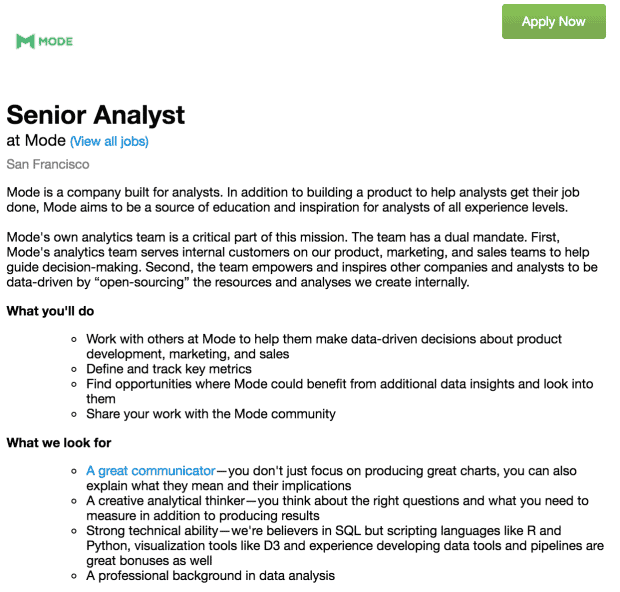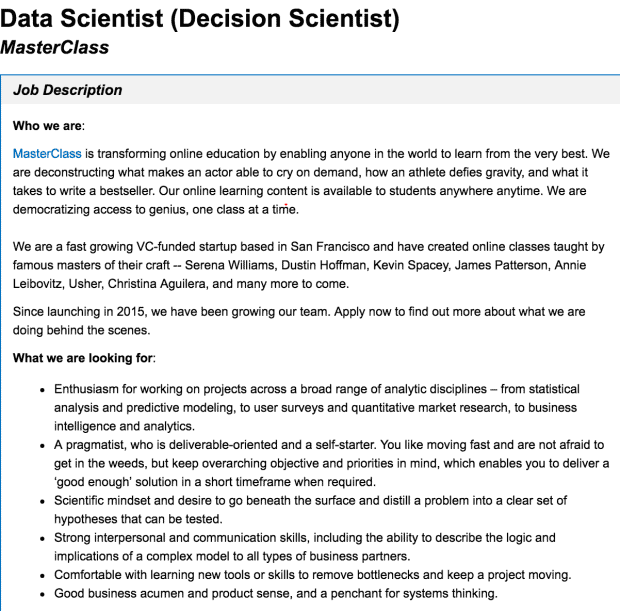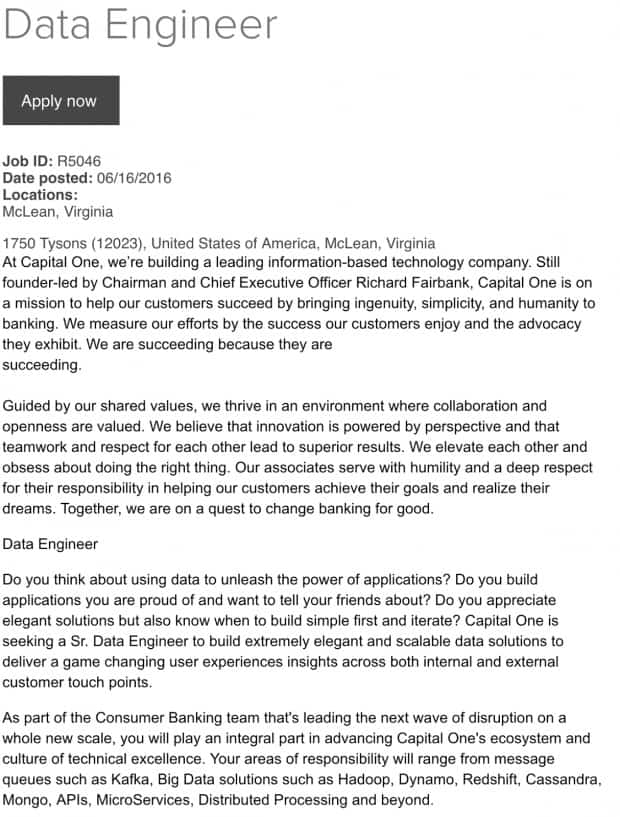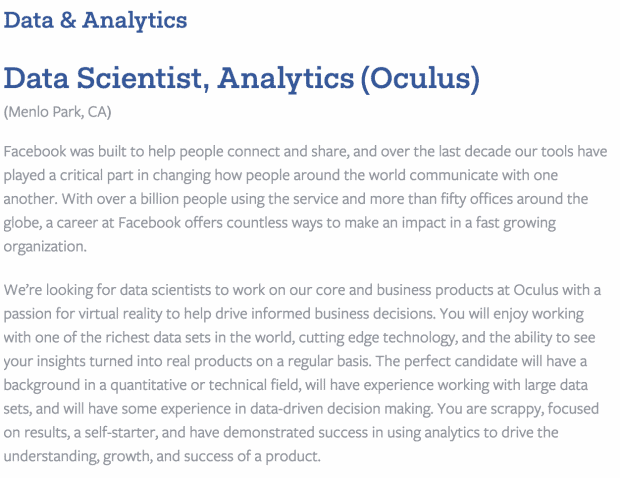Data science can mean something completely different depending on context. The problems you’ll face at an early-stage startup will be vastly different from the ones you’ll face at a Fortune 500 giant. Not only are there different roles in data science, there are also different companies with vastly different data science teams.
In general, these companies can be split into four rough categories.
1- Early-stage startups (200 employees or fewer) looking to build a data product
Welcome to the beating heartland of Silicon Valley. The early-stage startup is very high risk, but potentially high-return. If you join an early-stage startup, be prepared to wear a lot of hats and potentially take on all three data science roles at the same time. You will never have the resources you need in full, so be prepared to be scrappy and tough.
The bar will be especially high if the startup in question deals with data as its product. A platform optimizing other people’s data or applying machine learning to different datasets will have much higher standards for how they think about data than companies trying to learn from their own data. The co-founders will likely be pioneers in the field of data science or have led large-scale data science teams. They will be looking for A-players who have significant experience in the field or tons of potential and drive. If you join an organization like this, be prepared for the learning experience of a lifetime, and be prepared to be held to the highest standard possible when it comes to data science.
Examples of this company type: Looker, Mode Analytics, RJMetrics
Sample job postings: Data Analyst (Looker), Senior Analyst (Mode Analytics)

Number of companies: 143 associated on LinkedIn (11-50 company size)
How to read this job description: Focus on communication and scripting languages for querying and visualizing data indicates this is a business-facing role where insights must be communicated to relevant teams.
2- Early-stage startups (200 employees or fewer) looking to take advantage of their data
The bar will be lower if a startup is merely looking to take advantage of its data rather than selling a data product to other companies, but since the smart use of data is essential to the competitive advantage of a startup, you should still expect a relatively high bar.
Startups in the tech industry count with a lot of technical talent, but they need somebody to bridge the business and tech teams, especially if there are communication issues between the different teams on how data is used. Be prepared to work hard for the company to embrace being data-driven in all fronts, and be prepared to be the one who brings in new tools and processes for collecting and using data at all levels of the organization.
Working for a company that deals with its own data but doesn’t think about data at scale may be an unique challenge as you’ll be called upon to enforce and spread a data-driven culture throughout the organization. Be prepared to exercise your leadership and communication skills.
Lastly, B2B startups and B2C startups differentiate in the data they get. B2B startups are business-to-business; they sell software directly to large companies. Think Salesforce. B2C startups cater to many individual customers. Think Amazon. When you’re dealing with B2B startups, you’re likely going to be faced with data challenges that are small in volume but high in detail and features; startups that sell directly to businesses don’t have many customers, but they focus maniacally on the ones they do have since each individual customer will bring in lots of revenue. B2C startups will have more data problems dealing with volume and scale as they will have many more customers, but the focus on individual customers will be diluted to focus on groups of them. A B2B startup may deal with 1,000 customers, all of whom pay $1,000 a month. A B2C startup may deal with 100,000 users, but each user may only generate $1 in revenue a month!
Be familiar with the company you’re applying for and the unique data challenges it faces. Research thoroughly, and make sure you’re only applying for companies that fit your passions and skills.
Examples of this company type: Springboard, Branch, Rocksbox, Masterclass, Sprig
Sample job postings: Lead Data Scientist at Branch, Data Scientist (Research) at Rocksbox, , Data Scientist at Masterclass

Size of the company: 37 associated on LinkedIn (11-50 company size)
How to read this job description: Looking for a generalist who can dive deeper and still communicate different insights indicates this is a data scientist role that will be very broad in terms of skillsets demanded. This role is going to be proactive and entrepreneurial.
3- Mid-size and large Fortune 500 companies who are looking to take advantage of their data
The largest companies in the world know that taking advantage of their data is a top priority. Some will have established data science teams that are well-funded, robust, and fed with lots of data. Some will have startup-like teams within the organization to help them translate their data into business insights. There are a lot of companies hiring data science teams upon realizing how important data is to remaining competitive. Use this to your advantage; it can be easier passing the data science interview for a large, prestigious brand.
While a lot of these companies will have established corporate cultures and bureaucracies that make it harder to innovate, they will also have data on millions of people. Imagine processing logistics data for Walmart–you will have millions of data points, and your insights will make a difference in the lives of millions of people.
While these companies are not traditionally seen as the ones building cutting-edge data science solutions, there is still a lot of good work available for those who want to work on challenging datasets with talented teammates.
Examples of this company type: Walmart, JPMorgan, Morgan Stanley, Coca Cola, Capital One
Sample job postings: Data Scientist, Modeler at Morgan Stanley, Data Engineer at Capital One

Size of the company: ~30,000 associated on LinkedIn (10,000+ company size)
How to read this job description: Focus on Big Data tools indicates that this is going to be a fairly specialized role that looks into handling the immense amounts of data Capital One is holding.
4- Large technology companies with well-established data teams
Large technology companies are a breed in and of themselves. They’re the continuation of the startup obsession with data, except now they have scaled to a point dealing with millions of data points or more. Think of the Ubers, the Airbnbs, the Facebooks, and the Googles of the world. With large technical teams led by some of the most brilliant minds in the industry, data science roles here are heavily specialized, and you’ll work on cutting-edge problems with data that requires ferociously innovative thinking.
Come here if you crave a challenge and if you want to learn a lot with a lot of data points. The upside isn’t as good as the earlier stage startups, but you’ll get good perks, good salary, and great teammates–and a great CV job description in case you ever want to move on.
Examples of this company type: Facebook, Google, Airbnb
Sample job postings: Data Scientist, Oculus, Data Scientist Airbnb – Machine Learning

Size of the company: ~16,715 associated on LinkedIn (10,000+ company size)
How to read this job description: Focus on multi faceted, innovative skillset shows this is going to be an open-ended data science role that will be expected to think of new projects and lead them from end-to-end.
Like this article? Subscribe to our weekly newsletter to never miss out!
Image: Tom Taker, CC 2.0





